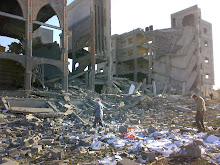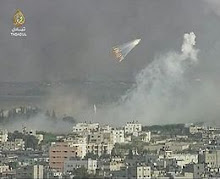dinsdag 29 juni 2010
Militanten vallen VN-kinderkamp aan in Nuseirat in de Gaza-strook
De groep militanten viel bewakers aan en zette het gebouw vervolgens in brand. De Verenigde Naties hebben de aanval veroordeeld.
De verklaring van de VN, waarin de aanval als laf wordt bestempeld:
GAZA: UN OFFICIAL CONDEMNS LATEST ATTACK ON CHILDREN’S RECREATIONAL FACILITY
The head of United Nations relief operations in Gaza has deplored this morning’s attack on a recreational facility used by children in the territory, the second such incident in a month.
A group of about 25 armed and masked men attacked and set fire to the facility on the beach in Nuseirat that was being used to host the Summer Games, run by the UN Relief and Works Agency for Palestine Refugees in the Near East.
No one was hurt in the incident, which follows a similar attack on 23 May when a group of 30 armed and masked men attacked and set fire to an UNRWA Summer Games facility that was under construction on the beach in Gaza City.
“Cowardly and despicable” is how John Ging, UNRWA’s Director of Operations in Gaza, described today’s attack. “The overwhelming success of UNRWA’s Summer Games has once again obviously frustrated those that are intolerant of children’s happiness,” he added.
Secretary-General Ban Ki-moon has called the Summer Games, which is in its fourth year, “a rare opportunity for relief from the deprivations and difficulties of everyday life in Gaza,” which has suffered from a three-year-long blockade imposed by Israel for what it called security reasons after Hamas took power there in 2007.
Mr. Ging said the attack will not deter UNRWA from continuing with the annual event, which is the largest recreation programme for Gaza’s children providing, among others, sports, swimming, arts and crafts, and drama.
“UNRWA will rebuild the camp immediately and will continue with its Summer Games programme which is so important for the physical and psychological well-being of Gaza’s children, so many of whom are stressed and traumatized by their circumstances and experiences,” he stated.
“This is another example of the growing levels of extremism in Gaza and further evidence, if that were needed, of the urgency to change the circumstances on the ground that are generating such extremism,” he added.
The Summer Games began on 12 June and will run through 5 August, providing 1,200 summer camps for more than 250,000 refugee children across Gaza.
(New York, Jun 28 2010)
vrijdag 18 juni 2010
Ban Ki-moon hoopt dat verlichting blokkade Gaza leven verbetert
Secretaris-generaal Ban Ki-moon van de Verenigde Naties heeft de hoop uitgesproken dat de Israëlische afzwakking van de blokkade van Gaza het leven in de strook land zal verbeteren. De volkenorganisatie is gereed om de hulpverlening aan de Gaza-strook op te voeren.
De verklaring van de VN:
UN CHIEF HOPES EASING OF ISRAELI BLOCKADE WILL HELP IMPROVE LIVES IN
Secretary-General Ban Ki-moon said today he hopes
“The Secretary-General is encouraged that the Israeli Government is reviewing its policy towards Gaza, and he hopes that today’s decision by the Israeli security cabinet is a real step towards meeting needs in Gaza,” his spokesperson said in a statement.
Mr. Ban has asked Robert Serry, the UN Special Coordination for the Middle East Peace Process, to immediately engage the Israeli Government to learn more about the decision and the additional measures needed to implement it.
The UN chief has repeatedly called for ending the blockade, which
He did so most recently in the wake of the 31 May incident in which
The UN, according to today’s statement, continues to seek “a fundamental change in policy” so that humanitarian assistance, commercial goods and people are able to flow through functioning open crossings, and reconstruction can take place.
The world body stands ready to scale up its efforts to help
Chris Gunness, spokesman for the UN agency that assists Palestinian refugees, known as UNRWA, reacted to
At the same time, he stressed that “for life for the Palestinians in
Mr. Gunness described the life of an ordinary Palestinian as grim, noting that the number of people who say they cannot feed their families has tripled in the last year to 300,000.
According to a UN report released last week, the ongoing Israeli blockade undermines prospects for employment and growth in
“The longer the closure continues, the more it undermines future prospects of workers and their families, in particular of the younger generation,” said the report, which was prepared by the International Labour Organization (ILO).
Meanwhile, the World Health Organization (WHO) has warned that the health system in
The blockade has meant that spare parts and replacements cannot be imported or only with great delays, engineers are unable to enter
For example, a $700,000 replacement for a derelict CT scanner for Shifa hospital in
“These essential items are just one example of the effects of the siege on
(VN:
Zie ook:
VN-Veiligheidsraad veroordeelt dodelijke aanval op Gaza-hulpkonvooi
maandag 14 juni 2010
VN-Veiligheidsraad veroordeelt dodelijke aanval op Gaza-hulpkonvooi
SECURITY COUNCIL CONDEMNS DEADLY RAID ON GAZA AID SHIPS
The Security Council today condemned Monday’s deadly Israeli military interception of a convoy of aid ships bound for Gaza, calling for a “prompt, impartial, credible and transparent investigation.”
At least ten people were killed when Israeli forces took control of a six-ship flotilla yesterday morning in international waters, according to press reports. The convoy was said to have been carrying educational, medical and construction materials, as well as hundreds of activists from different countries.
In the run-up to yesterday’s incident, which was also condemned by Secretary-General Ban Ki-moon and other United Nations officials, Israel has stated it would not let the vessels reach Gaza. The UN urged last week “that all involved act with a sense of care and responsibility and work for a satisfactory resolution.”
In a presidential statement issued early this morning, the Council said that it “deeply regrets the loss of life and injuries resulting from the use of force during the Israeli military operation in international waters against the convoy sailing to Gaza.”
The 15-member body called on Israel to immediately release the ships and civilians sailing on them, allow the countries involved to retrieve their deceased and wounded, and ensure the delivery of the humanitarian aid to Gaza.
The Council stressed that “the situation in Gaza is not sustainable,” again voicing its “grave concern” over the humanitarian situation in the area and emphasizing the need for the regular movement of goods and people.
The UN has repeatedly spoken out against the closure of Gaza and raised concern over the insufficient flow of material into the area to meet basic needs and spur reconstruction. Mr. Ban cautioned in a recent meeting that the closure “creates unacceptable suffering, hurts forces of moderation and empowers extremists.”
The Council today underscored that the only solution to the Israeli-Palestinian conflict is “an agreement negotiated between the parties,” reiterating that “only a two-State solution, with an independent and viable Palestinian State living side-by-side in peace and security with Israel and is other neighbours, could bring peace to the region.”
Voicing support for the proximity talks that started between the two sides last month, the Council urged the parties to act with restraint and avoid unilateral and provocative moves.
The UN Human Rights Council is holding a special meeting in Geneva on yesterday’s incident.
(VN: Jun, 1 2010)

.jpg)